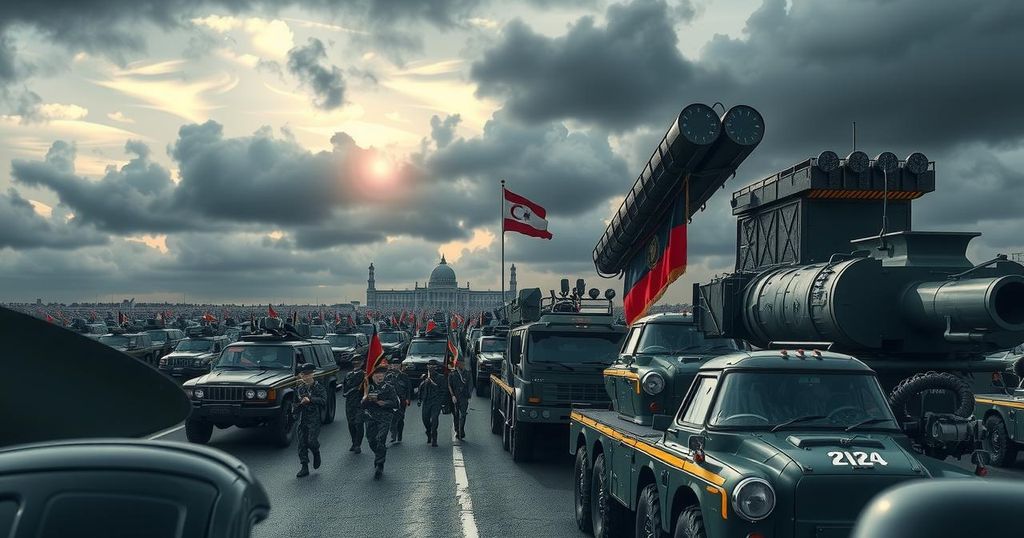Europe’s Leadership Faces Growing Threat from Autocratic Alliance

Leaders in Europe may not grasp the looming collaboration among authoritarian regimes, as demonstrated by a recent military display in Moscow featuring key autocrats. With support from China, Iran, and North Korea, Russia is bolstering its military rapidly while Europe appears complacent about this growing alliance against democracy. As the threat escalates, urgent action is needed for defense strategies and cohesion among European democracies.
Europe’s leaders may be overlooking the growing collaboration among authoritarian regimes as highlighted by a recent gathering in Moscow. During Russia’s commemoration of the Second World War’s end, President Vladimir Putin stood alongside various autocrats including Xi Jinping of China, in a public display of military might that raised alarms about an emerging alliance against democracy.
The event featured a parade, showcasing not only Russian forces but also crack troops from China and Iranian drones, indicating strong military support among the nations. While North Korea’s Kim Jong Un couldn’t be there, he symbolically celebrated ties with Russia back in Pyongyang, suggesting the depth of collaboration within this bloc of so-called ‘Crinks’—China, Russia, Iran, and North Korea.
The implications from Moscow were echoed at the London Defence Conference occurring simultaneously, where defense experts discussed the very real and concerning geopolitical implications of this autocratic alliance. It is not widely acknowledged in Western politics, yet the cooperation is palpable, particularly illustrated through Iran’s supply of drones and missiles, which have already been used against Ukraine, showcasing a deadly partnership in action.
North Korea, notably, has become a significant supplier of military hardware, sending thousands of containers filled with artillery and ammunitions to Russia to further bolster its military efforts against Ukraine. This may have overlooked implications that North Korean troops now actively support Russian military operations, a troubling thought for Europe and its democratic values, currently appearing complacent in the face of these threats.
China, while refraining from outright lethal aid, is heavily involved in enhancing Russia’s military capabilities through supplies of machinery and critical technology. It plays a vital role in sustaining Russia’s economy by buying significant amounts of oil—around two million barrels daily—as well as natural gas, keeping Putin’s regime afloat despite Western sanctions.
Amidst this grim realization of an emerging threat against democracy, the West remains largely hesitant to face these challenges head-on. Yet, according to military analysts, Putin is ramping up production for a military push, building a force projected to be larger than that of the United States and Europe combined, all with the backing of allied autocracies.
This situation leads to larger considerations about the United States’ commitment to traditional alliances, particularly as skepticism creeps into the diplomatic narrative of maintaining steadfast partnerships with European democracies. There lies a critical juncture where European leaders, perhaps most of whom seem unaware of the pressing urgency, must evaluate their defense strategies, especially with America’s role potentially diminishing.
Politicians across Europe appear hesitant to act with urgency. Some leaders like Macron remain questionable in their commitment to rearmament, while recent political shifts in Germany leave their military stance unclear. Meanwhile, countries like Poland and the Baltic states confront these threats directly, responding with greater awareness.
In Britain, the call for increased defense spending has fallen short according to experts, with current proposals deemed insufficient for the escalating situation. Talks at the London conference suggested a reevaluation of defense expenditures, calling for a commitment that reflects the real needs of national and collective security in these worrisome times.
Britain could step forward as a leader among European nations to forge a military alliance based on the existing framework of NATO, ensuring robust collective security against the rising threats posed by autocratic regimes. However, without a serious commitment to defense spending, any talk of leadership risks being seen as mere political rhetoric without substance.
In conclusion, Europe’s complacency toward the growing alliance of autocratic regimes poses a significant threat to its democratic foundations. Moscow’s recent military displays, coinciding with NATO concerns, underline an urgent need for both strategic reevaluation and robust defense investment. As autocracies fortify their ties, it becomes paramount for Europe to unite and enhance military readiness, avoiding reliance on uncertain commitments from the United States. Europe’s leaders must recognize the gravity of the situation and act decisively to secure their future against these threats.
Original Source: www.dailymail.co.uk







